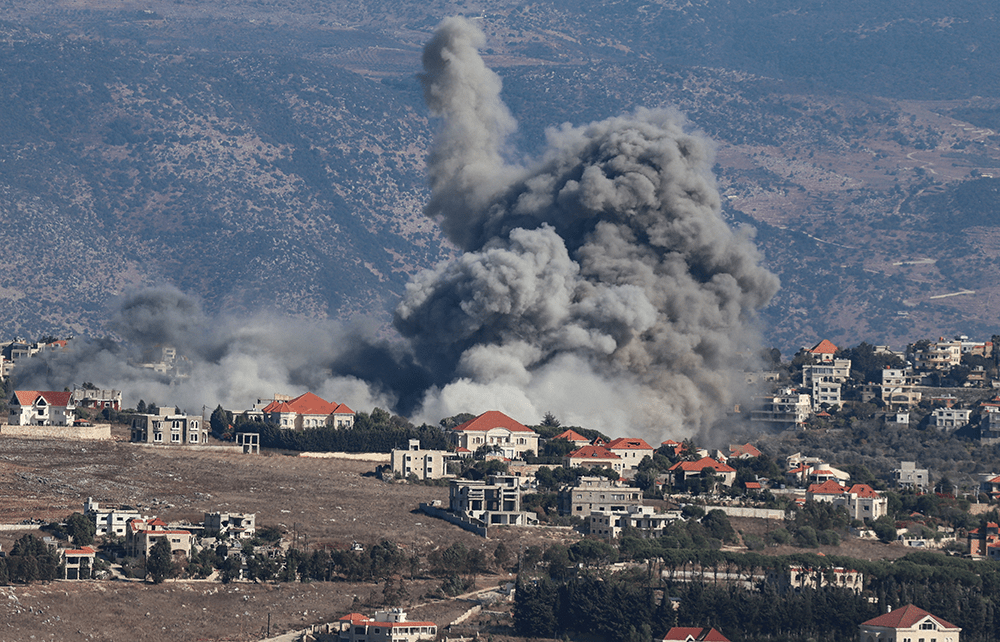Paul Wood has narrated this article for you to listen to.
The American general David Petraeus famously asked of the invasion of Iraq: ‘Tell me how this ends.’ That’s the question as Israeli bombs and missiles fall on Lebanon and the few missiles Hezbollah has sent in response are intercepted. Iran’s ‘axis of resistance’ seems paralysed with indecision. Does Benjamin Netanyahu take this as a win, the vindication of the enormous chance he took by opening a new northern front? Or, like a gambler intoxicated by success at the tables, does he press on? More airstrikes, followed by an invasion of Lebanon… and then the bombers fly on to Iran?
Some Israelis commentators are already calling this the Third Lebanon War (after the wars of 1982-2000 and 2006). That’s a fair description, given how many Lebanese have been killed, at least 600 at the time of writing. How long these punishing airstrikes continue depends, in part, on how many of Hezbollah’s rockets have been destroyed, and how many Israel’s war cabinet believe must be destroyed before the campaign can pause. One Israeli journalist, Ben Caspit, tweeted to say a political source was briefing that half of Hezbollah’s long-range rockets were gone – but the military had said otherwise and that ‘most of the work is still ahead of us’.
A convincing win for Netanyahu would be for the intense American mediation efforts under way to produce a new understanding with Hezbollah, one that ends rocket fire into northern Israel. Those efforts are being led by an American-Israeli former businessman, Amos Hochstein, who once served in the Israel Defence Forces. He doesn’t talk directly to Hezbollah because it’s proscribed by the US as a terrorist group. Instead, he goes through Shiite politicians in Lebanon. The message to them – and to Hezbollah – is said to be that the US won’t be able to restrain Israel if it comes to an all-out war.
Israel wants Hezbollah to pull back from the border to the far side of the Litani river, as called for by UN Resolution 1701, which set the terms for the end of the 2006 war. Such a move could be a humiliation too far for Hezbollah and might be impossible for it to swallow, especially if it results in the outcome Israel is trying to achieve: the end of mortar and rocket fire over the border. Hezbollah has been doing this in support of Hamas in Gaza since the day after 7 October. To stop now would be an admission that the ‘axis of resistance’ has been broken.
First, though, honour might require Hezbollah to make a show of revenge for the hundreds of dead and thousands of casualties in its ranks. One option: it could simply lie to save face. Last month, Hezbollah claimed a triumph in avenging the ‘targeted killing’ by Israel of one of its most senior commanders, Foud Shukr. They said that hundreds of Katyusha rockets had cleared the way for drones to hit two of Israel’s most sensitive intelligence sites, one a complex of Mossad buildings, the other the headquarters of Unit 8200, which is responsible for cyber warfare.
Some believe that Netanyahu has been manoeuvring all
along to attack Iran
With typical theatricality, Hezbollah named the operation for – and carried it out on – Arbaeen, the last of 40 days of mourning for Hussein, grandson of the prophet and one of Shia Islam’s greatest heroes. Unfortunately, the Tehran Times was almost alone in reporting that the operation had worked, saying that 22 Israelis were killed and 74 had been injured. Other outlets did not have this news. Hezbollah’s leader, Sheikh Hassan Nasrallah, gave a defiant speech. ‘Our data confirms that a significant number of drones reached these two targets, but the enemy is keeping it secret.’
That trick might not work again. In that case, would Hezbollah be goaded into using up its arsenal of long-range missiles, hidden deep underground? Until now, the Party of God has been restrained by public opinion in Lebanon, which has always been furiously opposed to anything that might provoke Israel into full-scale war. But views may have shifted with the terror and anger caused when Hezbollah’s pagers blew up in their hands all over Lebanon. It was a targeted attack but many innocent bystanders were hurt too. A headline in the left-wing Israeli newspaper Haaretz said: ‘Israelis should watch the footage from Lebanon with repulsion and fear, not glee.’ On Wednesday morning, Hezbollah fired a missile at Tel Aviv for the first time; it was destroyed mid-air by another missile from the Iron Dome defence system.
Fear, or at least a healthy respect for Israel’s capabilities, may be governing Hezbollah’s calculations. Over the past few days, Israel has demonstrated its military superiority. That goes for Iran too. Iran’s ancient air force would certainly come off worst in any clash with Israel’s squadrons of F-35s, now dominating the skies over Lebanon. The Iranian President, Masoud Pezeshkian, told journalists at the UN in New York: ‘We don’t want to fight. We don’t want war… We want to live in peace.’ A report on the US political website Axios quoted Israeli officials as saying Iran had rebuffed a plea from Hezbollah to attack Israel. The ‘timing wasn’t right’. After you; no, after you.
Perhaps the most likely outcome, then, is a brief upsurge in violence – including some ineffective retaliation by Hezbollah – followed by a new calm, with Israel much stronger than before. But that depends to no small extent on Netanyahu’s intentions. Netanyahu believes himself to be Israel’s man of destiny, the country’s Churchill, who understands threats that no one else perceives, the only one who knows what has to be done to ensure the country’s survival. He has argued many times over his long political career that a nuclear-armed Iran would be an existential threat to Israel. And Iran may be closer than ever to getting such a weapon.
Some of Netanyahu’s critics – and some of his friends – believe he has been manoeuvring all along to attack Iran, and to drag the US into such a war. The chess pieces are being positioned in a way that fits. First open the northern front. Second, humiliate Hezbollah so it takes the bait. Then, brace for the kind of attack that would demand action against Hezbollah’s backers in Tehran. Finally, call on the US to make sure Israel survives the wider Middle East war that follows. President Joe Biden is said to have privately voiced fears that this is exactly what Netanyahu is trying to do, according to a well-sourced report on NBC. Israel could win such a war – as it is demonstrating now in Lebanon – but at terrible cost to its enemies and to itself.







Comments